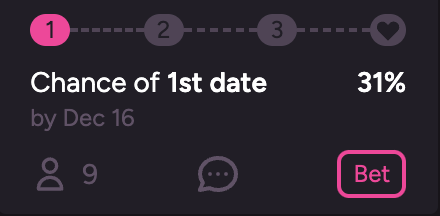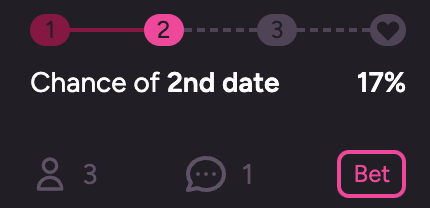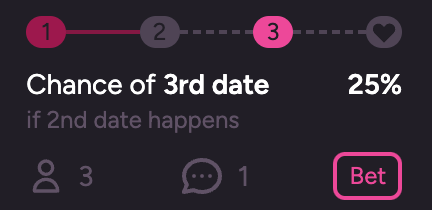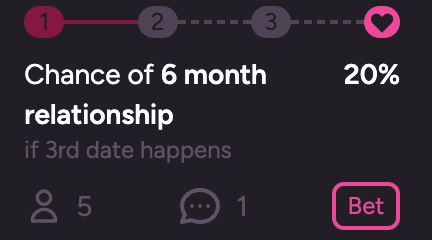Solving Two-Sided Adverse Selection with Prediction Market Matchmaking

0: Navigation
I’m aiming for a reader who knows what “prediction markets” and “adverse selection” are, who likes the first and not the second, and who enjoys systems that have neatly aligned incentives. For a primer on prediction markets, read Scott Alexander’s FAQ. If you’re already familiar with Manifold Love, skip to section 2.
COI: I’ve done some work for, might do some more work for, and own a tiny bit of equity in Manifold. I'm writing this independent of any work I'm currently doing or planning to do for Manifold or for any other entity. I just think the ideas are cool.
1: Love
Manifold, a play-money prediction market platform, recently released a prediction market dating app called “Manifold Love.” Users — those seeking love — sign up and fill out their profile like a regular dating app. Matchmakers — some of whom are users of the app themselves — pair users up. After a matchmaker makes a match, prediction markets are automatically created on various benchmarks of the pair’s (potential) relationship.




Screenshots of some markets on Manifold Love.
People make bets (using play-money) on whether the pair will go on a first date; conditional on that first date happening, a second date; conditional on the second date happening, a third; conditional on the third date happening, a 6 month relationship. The idea is that you should go on dates with matches who have the highest chance of leading to subsequent dates, and eventually turning into a relationship. Instead of guessing who that'll be, you can just check the prediction markets.
2: Generalizing
Importantly, Manifold Love’s setup isn’t limited to solving problems in the dating market. It solves (or a least, has the potential to solve) problems in all scenarios in which there’s two-sided adverse selection, where each side of a two-sided market selects for something disfavorable by the other side’s lights. In the words of Groucho Marx, “I don’t want to belong to any [country] club that would accept me as a member.” If a club wants Groucho Marx, it’s probably not a very good club, and vice versa — if Groucho Marx wants to be in a particular club, he's probably not a very desirable member.
More generally, the setup of "run a bunch of conditional prediction markets on a bunch of key benchmarks for potential pairs between two sides that are normally caught in adverse selection" seems like it could work pretty well.
One of the classic cases of two-sided adverse selection is the labor market, so here's how a sort of “Manifold Jobs” might play out. The platform has three entities:
- Prospective employees
- Prospective employers
- Headhunters
The platform makes a bunch of conditional prediction markets on key benchmarks for each of the first two entities. For example:
- Conditional on being hired by [prospective employer], will [prospective employee]:
- still be at their job in [timeframe]?
- have a higher weekly average life satisfaction rating in [timeframe] than they do now?
- etc.
- Conditional on hiring [prospective employee], will [prospective employer]:
- still be employing [employee] in [timeframe]?
- have a higher weekly average employee rating in [timeframe] than the previous employee did?
- etc.
If Manifold actually makes this, I'm sure it'll look somewhat different, much better, and far more fleshed out. But importantly, the dating and labor markets aren't the only two landscapes of two-sided adverse selection.
3: Insert Two-Sided Adverse Selection Here
There are a bunch of other landscapes of two-sided adverse selection where the conditional prediction market setup from Manifold Love could potentially solve a lot of problems:
- dating (Manifold Love)
- friendships
- gym partners
- grantmaking
- college applications/decisions
- grad school apps/decisions (e.g. med school, law school, business school, etc)
- labor/hiring/talent-seeking/jobs (as in section 2)
- cofounders
- seed- and preseed-stage investing
- child adoption
- internship applications/decisions
- used car sales
- tutoring
- events/venue spaces
- therapists/patients
- selling & buying insurance
- credit/lending
- residential & commercial real estate
- students picking classes at college
If you can think of more, tell me and I’ll add them here! Something to note: for most of the above, there's already some entity that acts as a middleman — real estate has realtors, the labor market has headhunters, adoption agencies pair up biological mothers with adopted families, etc. But all of them are pretty broken, biased, or at least wildly suboptimal. I'm excited about the potential of conditional prediction markets to improve on them and solve two-sided adverse selection.
4: Caveats
- As of my writing, I’m a lowly undergrad who’s never taken an economics class and has no idea what he’s talking about. I’ve done a bit of work in the prediction market & forecasting community, but I’m nowhere near an expert.
- We don’t even know if Manifold Love works with dating, let alone if it generalizes to other systems of two-sided adverse selection.
- Conditional prediction markets without prior commitment to randomization do not imply causation (a la DYNOMIGHT). This setup will give us association/correlation, but we won't know the existence nor direction of causality without prior commitment to randomization. And prior commitment to even some small amounts of randomization for some of these systems ranges from "quite difficult" to "hahaha good one, absolutely fucking not." Fortunately, I'm not sure you need to know causation, at least not to start out. I'm curious to see what happens if/when Manifold Love runs into this problem.
- Again, COI: I’ve done some work for, might do some more work for, and own a tiny bit of equity in Manifold. I'm writing this independent of any work I'm currently doing or planning to do for Manifold or for any other entity. I just think the ideas are cool.
- lunatic_at_large on LessWrong adds two more caveats that I didn't think of:
- "Suppose person A is open for dating and person B really wants to date them. By punting the decision-making process to the public, person A restricts themselves to working with publicly available information about person B and simultaneously person B is put under pressure to publicly reveal all relevant information. I can imagine a lot of Goodharting on the part of person B. Also, if it was revealed that person C bet against A and B dating and person B found out, I can imagine some … uh … lasting negative emotions between B and C. That possibility could also mess with person C’s incentives. In other words, the market participants with the closest knowledge of A and B also have the most to lose by A and B being upset with their bets and thus face the most misaligned incentives."
- "I can imagine circumstances where publicly revealing probabilities of things can cause negative externalities, especially on mental health. For example, colleges often don’t reveal students’ exact percentage scores on classes even if employers would be interested — the amount of stress that would induce on the student body could result in worse learning outcomes overall. In an example you listed, with therapists/patients, I feel like it might not be great to have someone suffering from anxiety watch their percentage chance of getting an appointment go up and down."